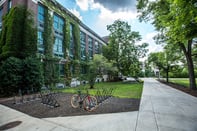Published on
Redefining Student Affairs with Student and Community Engagement

The role of student affairs is evolving to focus on personalized support services and foster deeper engagement among students and their families. In this interview, Romando Nash discusses how the pandemic has reshaped student interactions and the need to reteach students how to engage with peers and communities.
The EvoLLLution (Evo): How has the role of student affairs evolved in recent years, especially considering the response to the growing need for personalized student support services?
Romando Nash (RN): Student affairs has had to reintroduce itself in many different ways. We’ve always been the area that said, “It’s all about the student,” but we’re seeing deeper engagement among family and friends more than ever.
With that evolution, we must ensure clear communications through various channels to not only communicate with students but also with their families. We need to make people aware of the resources, individualized services and opportunities available. With these individualized needs students expect us to meet, we need to promote the traditional values of student affairs, like growth and independence, while finding new ways to connect to students.
Evo: What are some of the challenges student affairs professionals face in fostering engagement and retention with modern learners today?
RN: At the end of the day, we need to make sure we’re connecting with students as individuals. At the same time, we need to figure out ways to demonstrate and almost reteach students how to be in community or engage with their peers.
The pandemic created space for students to stay inside, but that isn’t going to help them socialize. It’s in our nature to foster engagement, but that’s hard to do when the students don’t really know how to engage. That’s been a challenge for us.
Even in K-12, we’ve found that many students struggle with engagement and making connections. If we don’t help them with this then we’ll struggle to retain them. They may look to another community or institution. That pressure increases a bit with time, but it’s something we have to walk into as we figure out that engagement and retention piece.
Evo: What are some best practices to overcome obstacles to enhancing engagement through innovative strategies?
RN: It starts with a one-on-one engagement notion that begins with how you’re engaging and connecting with not only students but also their families. There’s a need to be innovative with how we approach them, especially if they have siblings who will be looking to college in the future. We need opportunities for small, middle and large group activities in which students can engage. We then have to be intentional with every step we take.
Students also need opportunities to take a step back and recharge. One strategy we’ve implemented is placing sleeping pods in our student unions, along with dining facilities and recreational facilities throughout one of our buildings. This move has created a space that allows students to choose their level of engagement in a building with multifunctional spaces. Students can choose whether they need time alone or if they want to be in the mix of the crowd. It’s key to provide these places that meet students’ various needs. We must teach them how to engage with us and others, while making it easy to do so. Otherwise, they won’t bother.
Evo: How do you measure the effectiveness of these student affairs initiatives and promoting student engagement and success?
RN: Part of it is simple use along with doing the quantitative aspects of numbers. If we know the numbers of students in these spaces, that lets us know whether we’re doing something right. The other piece is really sitting there and engaging with students.
We have a student affairs advisory board where students provide feedback. I also do monthly lunches with students. Folks across the institution provide me with a nomination that is simply a student’s name. Every month we then select a group of students for these lunches. It allows me to hear what’s working and what’s not directly from the source. Students aren’t afraid to share what isn’t working.
Evo: What future trends do you anticipate in student affairs?
RN: Everything today is about technology, so we have to find ways to let go of our preconceived notion of it. Is there a way for us to not keep AI at arm’s length and get it in front of it? There’s a need for us to enhance our work through technology that benefits the student more professional staffs or administrators.
We’ll never keep up with whatever the latest trend is, but is there a way for us to use what we have in places and spaces that helps us at least follow the curve instead of trying to catch up? We want to stay engaged with students in whatever way they can access us in their busy lives. We must leverage technology to deliver on this mission and be more intentional about the opportunities we create.
Evo: Is there anything you’d like to add?
RN: Student affairs as a profession is at a crossroads if you really think about it. There’s a need for us to reinvent ourselves and take back our narrative in many different ways. We’re always going to be about students and for students, but there are opportunities for us to redefine what that means and how that looks based on what we’ve learned and seen the last five years. We need to walk into that space and prepare it for the next round of folks coming through K- 12. And hopefully, as a profession, we embrace that and not necessarily try fight it.



